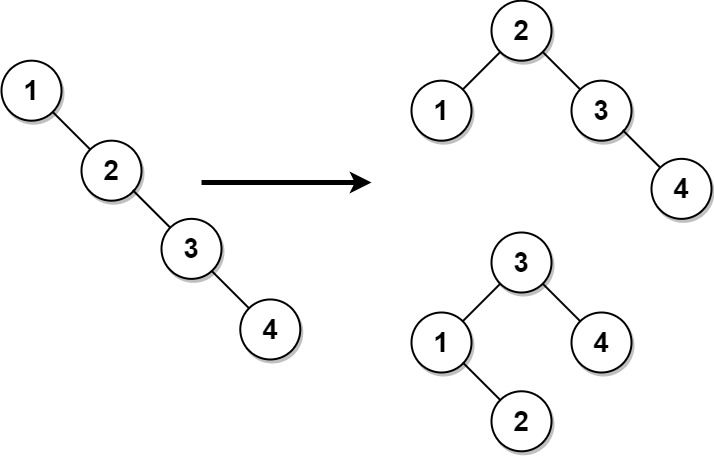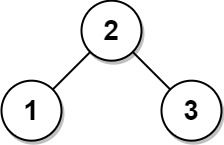Given the root of a binary search tree, return a balanced binary search tree with the same node values. If there is more than one answer, return any of them.
A binary search tree is balanced if the depth of the two subtrees of every node never differs by more than 1.
Example 1:
Input: root = [1,null,2,null,3,null,4,null,null] Output: [2,1,3,null,null,null,4] Explanation: This is not the only correct answer, [3,1,4,null,2] is also correct.
Example 2:
Input: root = [2,1,3] Output: [2,1,3]
Constraints:
- The number of nodes in the tree is in the range
[1, 104]. 1 <= Node.val <= 105
Since the original tree is a binary search tree, we can save the result of the in-order traversal in an array
The execution logic of the function
- If
$i > j$ , then the balanced binary search tree is empty, return an empty node; - Otherwise, we take
$mid = (i + j) / 2$ as the root node, then recursively build the left and right subtrees, and return the root node.
The time complexity is
# Definition for a binary tree node.
# class TreeNode:
# def __init__(self, val=0, left=None, right=None):
# self.val = val
# self.left = left
# self.right = right
class Solution:
def balanceBST(self, root: TreeNode) -> TreeNode:
def dfs(root: TreeNode):
if root is None:
return
dfs(root.left)
nums.append(root.val)
dfs(root.right)
def build(i: int, j: int) -> TreeNode:
if i > j:
return None
mid = (i + j) >> 1
left = build(i, mid - 1)
right = build(mid + 1, j)
return TreeNode(nums[mid], left, right)
nums = []
dfs(root)
return build(0, len(nums) - 1)/**
* Definition for a binary tree node.
* public class TreeNode {
* int val;
* TreeNode left;
* TreeNode right;
* TreeNode() {}
* TreeNode(int val) { this.val = val; }
* TreeNode(int val, TreeNode left, TreeNode right) {
* this.val = val;
* this.left = left;
* this.right = right;
* }
* }
*/
class Solution {
private List<Integer> nums = new ArrayList<>();
public TreeNode balanceBST(TreeNode root) {
dfs(root);
return build(0, nums.size() - 1);
}
private void dfs(TreeNode root) {
if (root == null) {
return;
}
dfs(root.left);
nums.add(root.val);
dfs(root.right);
}
private TreeNode build(int i, int j) {
if (i > j) {
return null;
}
int mid = (i + j) >> 1;
TreeNode left = build(i, mid - 1);
TreeNode right = build(mid + 1, j);
return new TreeNode(nums.get(mid), left, right);
}
}/**
* Definition for a binary tree node.
* struct TreeNode {
* int val;
* TreeNode *left;
* TreeNode *right;
* TreeNode() : val(0), left(nullptr), right(nullptr) {}
* TreeNode(int x) : val(x), left(nullptr), right(nullptr) {}
* TreeNode(int x, TreeNode *left, TreeNode *right) : val(x), left(left), right(right) {}
* };
*/
class Solution {
public:
TreeNode* balanceBST(TreeNode* root) {
dfs(root);
return build(0, nums.size() - 1);
}
private:
vector<int> nums;
void dfs(TreeNode* root) {
if (!root) {
return;
}
dfs(root->left);
nums.push_back(root->val);
dfs(root->right);
}
TreeNode* build(int i, int j) {
if (i > j) {
return nullptr;
}
int mid = (i + j) >> 1;
TreeNode* left = build(i, mid - 1);
TreeNode* right = build(mid + 1, j);
return new TreeNode(nums[mid], left, right);
}
};/**
* Definition for a binary tree node.
* type TreeNode struct {
* Val int
* Left *TreeNode
* Right *TreeNode
* }
*/
func balanceBST(root *TreeNode) *TreeNode {
ans := []int{}
var dfs func(*TreeNode)
dfs = func(root *TreeNode) {
if root == nil {
return
}
dfs(root.Left)
ans = append(ans, root.Val)
dfs(root.Right)
}
var build func(i, j int) *TreeNode
build = func(i, j int) *TreeNode {
if i > j {
return nil
}
mid := (i + j) >> 1
left := build(i, mid-1)
right := build(mid+1, j)
return &TreeNode{Val: ans[mid], Left: left, Right: right}
}
dfs(root)
return build(0, len(ans)-1)
}/**
* Definition for a binary tree node.
* class TreeNode {
* val: number
* left: TreeNode | null
* right: TreeNode | null
* constructor(val?: number, left?: TreeNode | null, right?: TreeNode | null) {
* this.val = (val===undefined ? 0 : val)
* this.left = (left===undefined ? null : left)
* this.right = (right===undefined ? null : right)
* }
* }
*/
function balanceBST(root: TreeNode | null): TreeNode | null {
const nums: number[] = [];
const dfs = (root: TreeNode | null): void => {
if (root == null) {
return;
}
dfs(root.left);
nums.push(root.val);
dfs(root.right);
};
const build = (i: number, j: number): TreeNode | null => {
if (i > j) {
return null;
}
const mid: number = (i + j) >> 1;
const left: TreeNode | null = build(i, mid - 1);
const right: TreeNode | null = build(mid + 1, j);
return new TreeNode(nums[mid], left, right);
};
dfs(root);
return build(0, nums.length - 1);
}
